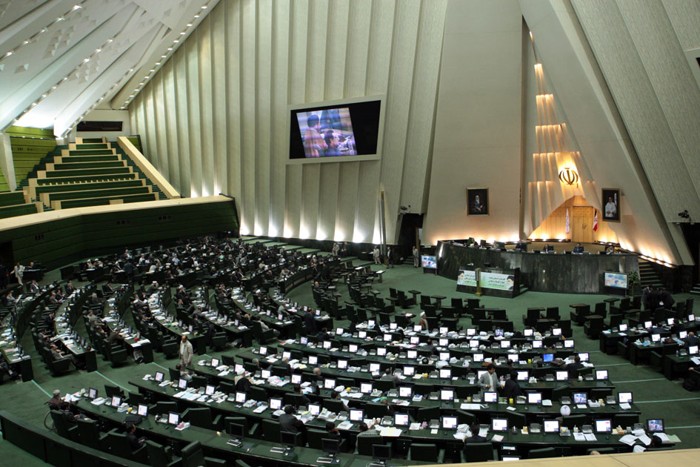In the days since the conclusion of the Vienna accord, members of the Islamic Consultative Assembly have come up with three ideas as far as the role of parliament in reviewing the Iran nuclear deal goes. These three ideas have to do with differences across party lines in the chamber.
Tabnak.ir, a news website, on August 10 ran an analytical report on political bickering in the Iranian parliament over how to review the Joint Comprehensive Plan of Action (JCPOA). The following is the translation of the report in its entirety:
These three views can be reviewed according to the role – lesser or stronger – parliament is given in the review process of JCPOA:
I. Review of JCPOA in a special parliamentary committee, not on parliament floor
II. Review of JCPOA on parliament floor and a ‘yes’ or ‘no’ vote to the general outlines of JCPOA without going into details
III. Review of every single article of JCPOA on parliament floor and possibly changing [parts of] it.
The first view, which has been supported by Speaker Ali Larijani, does not want JCPOA to be reviewed in parliament at all. If there is going to be any review, it argues, it should be held in a parliamentary committee. Days after the conclusion of the deal, the top MP underlined that parliament should not get involved in the review process, saying that the nuclear issue is dealt with under the supervision of the Supreme Leader. He argued that parliament should not be concerned about it, [because] the country’s expediency will be decided on and a report will be submitted to the chamber.
Larijani’s view drew mixed reactions, especially from the principlist critics in parliament. The speaker seems to have gradually backpedalled on his initial stance in recent days, describing parliament’s involvement as a factor which contributes to greater support for the deal and to building a consensus among politicians.
According to the Constitution, the Islamic Consultative Assembly should make comments on such international treaties, he said, adding there are some cases – Resolution 598, for instance – on which parliament has not passed any judgment. We solve the nuclear issue; perhaps it is a better idea if parliament comments, something which will help lend support [to the deal] and form a consensus [in the country], Larijani further said.
His recent remarks and his willingness to have parliament’s comments on and support for JCPOA probably suggest that JCPOA can be reviewed in a special parliamentary committee, because he does not say outright that the deal should be reviewed on parliament floor and just stresses that it is good to have parliament’s view as well. The review of JCPOA in a special committee was raised from the very beginning. Accordingly, a special committee whose members are picked on parliament floor will review the general outlines, not the details, of JCPOA after it wins the blessing of the Supreme National Security Council.
The second view calls for the review of JCPOA on parliament floor, without touching its details. The floor review entails an in-house vote in a plenary session of the chamber with MPs saying a simple ‘yes’ or ‘no’ to the general outlines of JCPOA. Under this arrangement, articles of the deal won’t be reviewed on parliament floor and deputies can merely voice their confirmation of or opposition to the general outlines of JCPOA.
Abbas Ali Mansouri Arani, a member of parliament’s National Security and Foreign Policy Committee, says, “Deputies will provide a simple yes or no answer to one question on JCPOA: Do you approve of JCPOA?. They will only voice their agreement or opposition. Except this, nothing will be discussed in the open session of parliament, and the MPs will not allowed to get involved in [the review of] the text. Any changes to JCPOA’s text, even the slightest, require all six countries [which made up P5+1] to come together and make comments on those changes. This is not feasible”.
The third view, which is mainly pursued by members of the Islamic Revolution Stability Front, says the government should submit JCPOA in the form of a bill to parliament and then deputies should review the details and every article of JCPOA on parliament floor. It also allows MPs to make changes to the deal. If JCPOA cannot be changed, it should be either accepted or rejected in its entirety.
Mohammad Soleimani, an MP who is also a member of the Islamic Revolution Stability Front, explained this view in comments he made in parliament, “By getting involved in the text and making well-reasoned and responsible comments in favor or against the text, the Islamic Republic of Iran will know that what it is going to sign.
“I wonder why some, especially in the government and a member of the negotiating team, are concerned about parliament’s involvement in [reviewing] the text. What is it in the text that should not be made public? Who would stand to lose if people and MPs learned about the upsides and downsides of the deal and voted for it insightfully?
“An expert review of JCPOA should focus on the text and let go of marginal issues, speeches and slogans. The negative aspects of the text of the deal cannot be sugarcoated through double-dealing. Contradictory, ambiguous speeches and interviews will not help carry out a task that requires expertise.
“Is it possible not to be concerned after [hearing] baseless and misleading claims that Fordow, Arak and Natanz [Iran’s three nuclear facilities] are inefficient? Breakthroughs and glories cannot be downplayed by simplification, double-dealing, and offering the proverbial worthless thing to charity. The country should not be left in the grip of problems in the future. Denying parliament its legal right is not acceptable no matter who does it, the government, parliament’s Presiding Board or the chiefs of caucuses in the chamber.”
